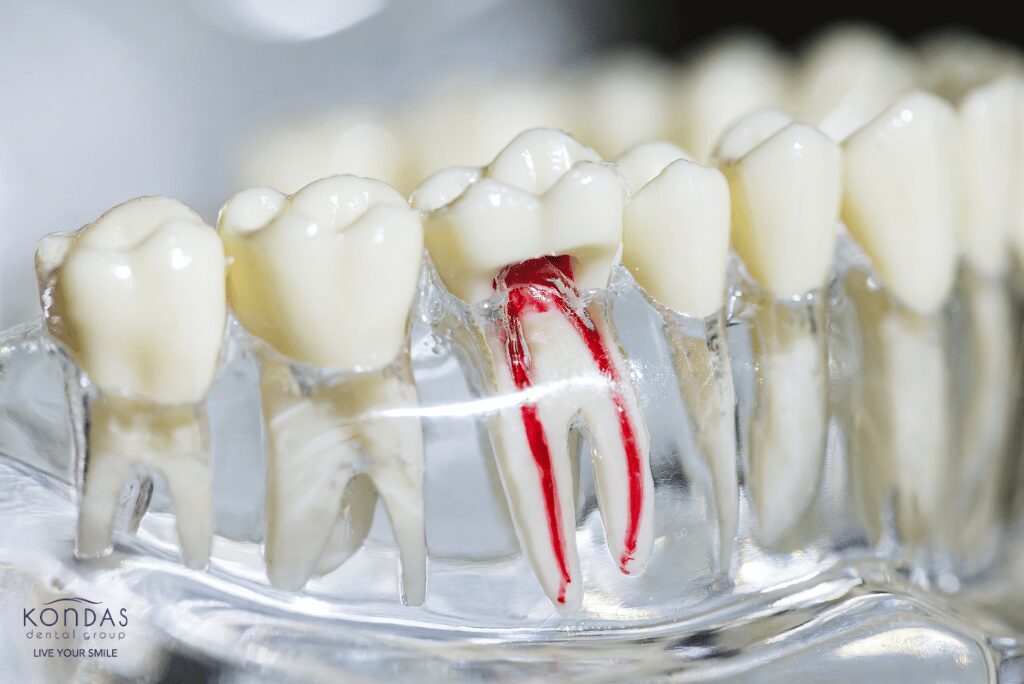A root canal can last 10 to 15 years, and in many cases, even a lifetime with proper care. This procedure is a reliable way to save an infected or damaged tooth by removing the diseased tissue and sealing the inner space to prevent further problems.
While root canal therapy offers long-term relief and helps preserve your natural tooth, the exact lifespan of a treated tooth depends on several factors, including where the tooth is located, how well the treatment is done, and how you care for your oral health afterward.
Understanding what affects the longevity of a root canal can help you protect your dental health and avoid retreatment in the future. Opting for expert care with a root canal in Huber Heights, Ohio can greatly improve the chances of long-term success.

What Is Root Canal Therapy?
Root canal therapy removes infected or damaged pulp from inside a tooth. Pulp is made up of nerves, blood vessels, and connective tissue. When pulp becomes inflamed or infected due to decay, a deep cavity, or cracks, it can cause pain and swelling.
During treatment, a dentist or endodontist cleans out the infected tissue, fills and seals the root canals, and restores the tooth’s strength—often using a permanent crown.
This process allows you to keep your natural tooth, which helps preserve the structure and function of your mouth.
Average Lifespan of a Root Canal
On average, a root canal can last 10 to 15 years. Some last much longer, especially when the treated tooth is protected properly. Factors that affect the lifespan include:
- Whether the tooth is a front tooth or a back tooth
- Whether a crown is placed soon after the procedure
- The condition of the tooth before treatment
- How well you care for your teeth after treatment
Front teeth often last longer after treatment. They typically have fewer roots and deal with less pressure from chewing. Back teeth, like molars, handle more stress and usually need more support to stay strong.
The Role of a Permanent Crown
After root canal treatment, the tooth structure becomes more brittle. A permanent crown helps restore strength and reduce the risk of future damage or reinfection.
Crowns are especially important for back teeth. These teeth bear the most chewing pressure and are more likely to crack if left unprotected. In most cases, a dentist will place a temporary crown first, followed by a longer-lasting crown made from porcelain, zirconia, or metal.
Placing the crown soon after treatment lowers the risk of bacteria re-entering the cleaned canal. Without this step, the longevity of a root canal can drop sharply.

What Affects How Long a Root Canal Lasts?
Root canals don’t fail often, but when they do, one or more causes are usually involved. The success of root canal therapy depends on many key factors.
Here are the most common influences on how long a treated tooth lasts:
- Tooth location: Molars wear down faster than front teeth.
- Crown placement: Delayed or missing crowns allow the tooth to weaken.
- Oral hygiene: Poor brushing or flossing leads to decay and infection.
- Tooth cracks: Fractures not treated in time can shorten the lifespan of the root canal.
- Pre-existing issues: Teeth with severe decay or infection may have a lower success rate.
Keeping visits with your dentist and following care instructions greatly improves your chances of long-term success.
Warning Signs of Root Canal Failure
Even when performed correctly, root canal treatment can sometimes fail. This is uncommon, but it’s important to recognize the signs. If a root canal does fail, discomfort is often the first indication that something isn’t right.
You may notice ongoing pain in the treated tooth, swelling in the gum or jaw, or a change in how the area feels when chewing. Some people report a foul taste or smell near the tooth, or see a pimple-like bump forming on the gums.
These symptoms may point to an infection or a breakdown in the seal of the treated area. If you experience any of these changes, contact your Huber Heights dentist. Addressing the issue early improves the chances of saving the tooth through retreatment.
How to Make Your Treated Tooth Last Longer
Proper care is the most important part of keeping your treated tooth strong. Root canal success isn’t only about what happens in the clinic—it’s also about what you do at home.
You can support your long-term dental health by following a few simple habits:
- Brush your teeth twice daily with fluoride toothpaste
- Floss once a day to reduce plaque buildup on teeth
- Avoid chewing on hard items like ice or pens
- Don’t miss regular dental cleanings and checkups
- Address any signs of decay or damage early
These steps reduce the chance of new infection and protect both the treated tooth and surrounding teeth from damage.

Should You Consider Extraction Instead?
Some people ask whether it’s better to remove an infected tooth instead of trying to save it. In most cases, keeping your natural tooth with root canal therapy is the best option.
An extracted tooth often needs to be replaced with an implant or bridge to maintain proper function. Root canals allow you to keep the original structure of your mouth and avoid alignment issues.
Choosing to save your natural tooth helps maintain healthy bone, avoid bite problems, and reduce future dental procedures.
Final Thoughts on the Longevity of Root Canals
So, how long do root canals last? It depends on factors like where the tooth is located, whether a crown is placed on time, and how well you take care of your teeth.
Generally, root canal treatment can last 10 to 15 years—and often much longer.
Use good oral hygiene, avoid habits that strain the tooth, and make regular dental visits part of your routine. When you protect the treated tooth with a permanent crown and follow proper care steps, the chances of keeping your natural tooth long-term are high.
Frequently Asked Questions
What happens 10 years after a root canal?
If the tooth was properly treated and cared for, it can remain healthy and functional. However, it’s important to continue regular dental checkups to catch any signs of wear or reinfection early.
Can a 20-year-old root canal get infected?
Yes. Even after many years, a treated tooth can become infected if the seal breaks down, the crown is damaged, or decay reaches the inner tooth again.
How often do root canals need to be redone?
Most root canals do not need to be redone. Retreatment is only necessary if the initial procedure fails or the tooth becomes reinfected.
Can you have a second root canal on the same tooth?
Yes. A dentist can perform a second root canal, known as retreatment, if the first one fails or complications develop later.
